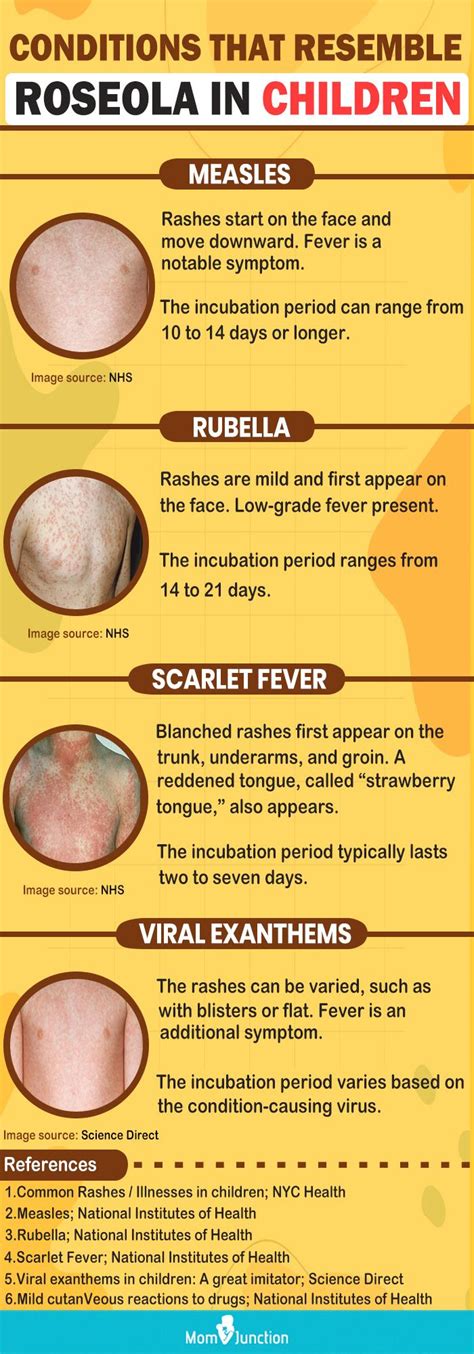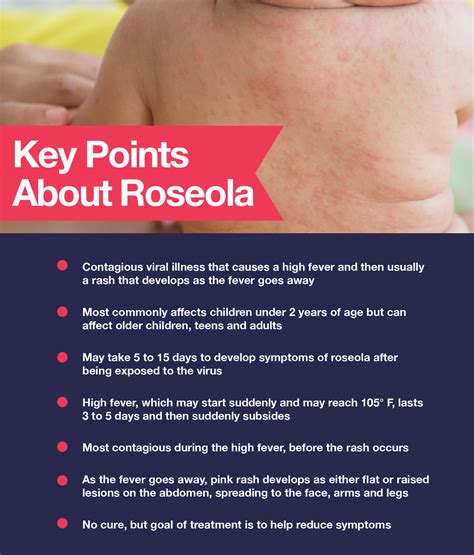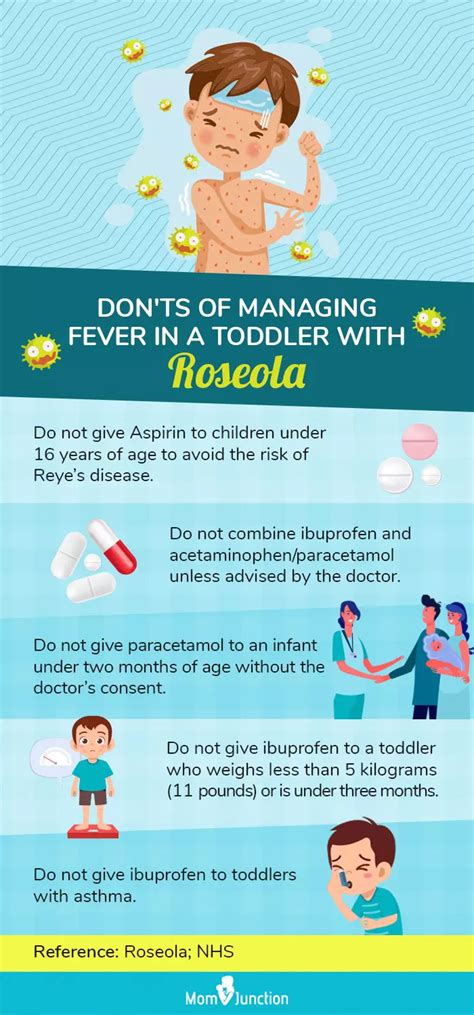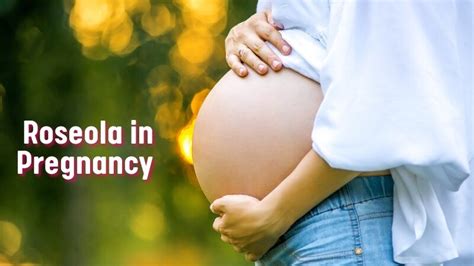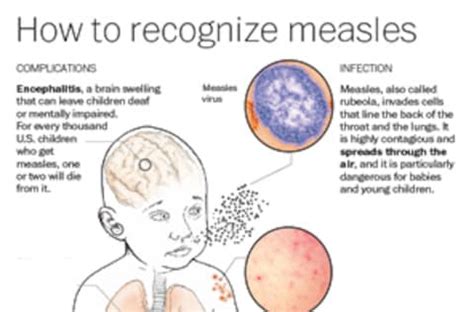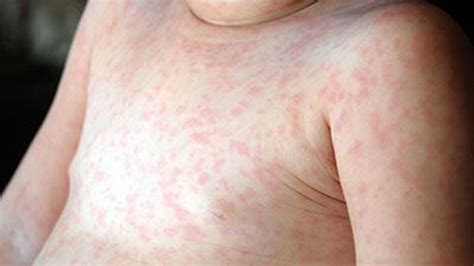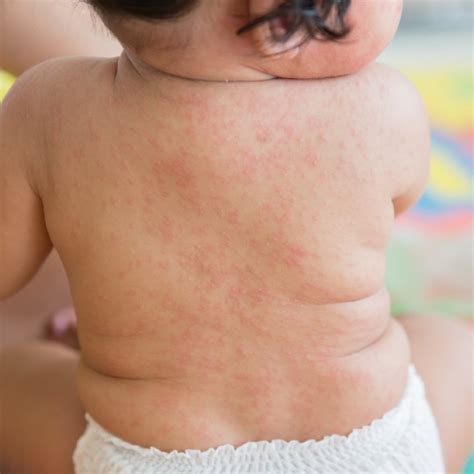Roseola is a common and highly contagious viral illness that affects infants and young children. It is characterized by a high fever, followed by a rash that appears once the fever has subsided. Understanding the duration and recovery time of roseola is essential for parents and caregivers to provide the best possible care for their child. Roseola typically lasts for around 7-10 days, but the recovery time can vary depending on several factors, including the child's age, overall health, and the severity of the illness. In this article, we will delve into the world of roseola, exploring its causes, symptoms, treatment options, and most importantly, its duration and recovery time.
The roseola virus is usually spread through respiratory droplets, such as those released during coughing or sneezing, or through contact with contaminated surfaces. Once a child is infected, the virus incubates for around 5-15 days before symptoms appear. The initial symptoms of roseola include a high fever, which can reach temperatures of up to 104°F (40°C). This fever can last for 3-5 days and is often accompanied by irritability, loss of appetite, and fatigue. As the fever subsides, a rash appears, typically on the trunk, arms, and legs. The rash is usually pink or red and can last for several days.
Roseola Symptoms And Diagnosis
The symptoms of roseola can be alarming for parents, especially the high fever and rash. However, in most cases, roseola is a self-limiting illness, meaning it will resolve on its own without the need for specific treatment. A diagnosis of roseola is typically made based on the child's symptoms and physical examination. In some cases, a blood test or swab test may be performed to confirm the diagnosis and rule out other potential causes of the symptoms.
Roseola Treatment And Management
While there is no specific treatment for roseola, there are several ways to manage the symptoms and support the child's recovery. Acetaminophen or ibuprofen can be used to reduce the fever and relieve discomfort. It is essential to follow the recommended dosage instructions and consult with a healthcare professional before administering any medication. Additionally, keeping the child cool, providing plenty of fluids, and using a humidifier to relieve congestion can help alleviate symptoms.
Roseola Duration And Recovery Time
The duration of roseola can vary depending on the child's age and overall health. In general, the illness lasts for around 7-10 days, with the fever subsiding within 3-5 days. The rash can last for several days, but it usually fades within a week. The recovery time for roseola is typically quick, with most children returning to their normal activities within a week or two. However, some children may experience lingering fatigue or irritability, which can persist for several weeks.
Roseola Complications And Risks
While roseola is generally a mild illness, there are some potential complications and risks to be aware of. These include secondary bacterial infections, such as pneumonia or ear infections, which can occur in rare cases. Additionally, children with weakened immune systems, such as those with underlying medical conditions or taking immunosuppressive medications, may be at increased risk of developing more severe symptoms or complications.
Roseola Prevention And Precautions
Preventing the spread of roseola is essential to reduce the risk of infection. This can be achieved by practicing good hygiene, such as frequent handwashing, avoiding close contact with infected individuals, and keeping surfaces clean. Additionally, ensuring that children are up-to-date on their vaccinations and maintaining a healthy lifestyle can help boost their immune system and reduce the risk of infection.
Roseola In Adults
While roseola is most commonly associated with infants and young children, adults can also contract the illness. In adults, roseola is often milder and may not always be accompanied by a rash. However, adults with weakened immune systems or underlying medical conditions may be at increased risk of developing more severe symptoms or complications.
Roseola And Pregnancy
Pregnant women who contract roseola are at increased risk of developing more severe symptoms or complications. Additionally, there is a small risk of transmitting the virus to the unborn baby, which can increase the risk of birth defects or miscarriage. Pregnant women who suspect they have contracted roseola should seek medical attention immediately to discuss the best course of treatment and management.
Roseola Vaccination
Currently, there is no vaccine available to prevent roseola. However, researchers are working to develop a vaccine that can protect against the roseola virus. In the meantime, practicing good hygiene, avoiding close contact with infected individuals, and maintaining a healthy lifestyle can help reduce the risk of infection.
Roseola Home Remedies
While there is no specific treatment for roseola, there are several home remedies that can help alleviate symptoms and support the child's recovery. These include using a cool compress to reduce the fever, providing plenty of fluids to stay hydrated, and using a humidifier to relieve congestion. Additionally, keeping the child comfortable and relaxed can help reduce irritability and promote a speedy recovery.
Roseola When To Seek Medical Attention
While roseola is generally a mild illness, there are some instances where medical attention is necessary. These include if the child's fever exceeds 104°F (40°C), if the rash is severe or widespread, or if the child is experiencing difficulty breathing, vomiting, or diarrhea. Additionally, if the child has a weakened immune system or underlying medical condition, it is essential to seek medical attention immediately to discuss the best course of treatment and management.
What is the typical duration of roseola?
+
Roseola typically lasts for around 7-10 days, with the fever subsiding within 3-5 days.
How is roseola diagnosed?
+
A diagnosis of roseola is typically made based on the child's symptoms and physical examination. In some cases, a blood test or swab test may be performed to confirm the diagnosis and rule out other potential causes of the symptoms.
Can adults contract roseola?
+
Yes, adults can contract roseola, although it is most commonly associated with infants and young children. In adults, roseola is often milder and may not always be accompanied by a rash.
Is there a vaccine available to prevent roseola?
+
Currently, there is no vaccine available to prevent roseola. However, researchers are working to develop a vaccine that can protect against the roseola virus.
What are some home remedies to alleviate roseola symptoms?
+
Some home remedies to alleviate roseola symptoms include using a cool compress to reduce the fever, providing plenty of fluids to stay hydrated, and using a humidifier to relieve congestion.
In conclusion, roseola is a common and highly contagious viral illness that affects infants and young children. While it is generally a mild illness, there are some potential complications and risks to be aware of. By understanding the duration and recovery time of roseola, parents and caregivers can provide the best possible care for their child and support their speedy recovery. If you have any further questions or concerns about roseola, please do not hesitate to comment below or share this article with others who may find it helpful. Additionally, if you have experienced roseola or have any tips for managing its symptoms, please share your story to help others who may be going through a similar experience.
